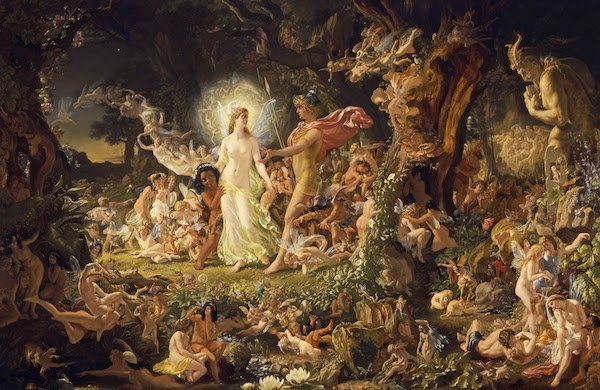IN Series present imaginative “radio” retooling of Purcell’s “Fairy Queen”

“The Quarrel of Oberon and Titania” by Sir Joseph Noel Paton, 1849.
The IN Series made it through the pandemic by shifting to filmed performances in innovative ways. Now that live performances are possible again, the group is re-adapting some of those virtual productions to staged ones.
Such was the case with Timothy Nelson’s A Fairy Queen, a mash-up of Shakespeare’s A Midsummer Night’s Dream and Purcell’s Fairy Queen masque composed to go with it, and other Purcell songs heard Sunday afternoon at Atlas Performing Arts Center.
Online the production was cast as an old-time radio show, complete with narration and zany sound effects. Its four hour-long podcast sections were trimmed and joined together in a semi-staging of four acts, lasting nearly three hours with a single intermission.
Nine soloists stepped up to microphones in the on-stage “studio,” both reciting excerpts of Shakespeare’s plays and singing Purcell selections. Three ensemble singers rounded out the larger numbers, with tongue-in-cheek radio narration from John T.K. Scherch.
British soprano Lucy Page sang and declaimed Shakespeare equally well, making her an imperious Titania. Her vocal control and agile runs featured to stunning effect in “Ye gentle spirits of the air,” adapted for Titania from the masque’s nymph role. She also excelled in Purcell’s sacred song “Now that the sun hath veil’d his light,” repurposed here as Titania’s love entertainment for Bottom. The man-donkey nuzzled her to hilarious effect in the melismas of the concluding “Hallelujah.”
British countertenor Benjamin Williamson matched Page in every way as Oberon, making their duet “Thrice happy lovers,” adapted from Juno’s aria in Purcell’s masque, a special delight. His impeccable runs gleamed in “Fly swiftly, ye hours,” another extra Purcell aria grafted onto the work. He entranced the audience with a slow, jazz-tinged rendition of Purcell’s “Music for a while,” with the snakes dropping from Alecto’s head becoming the drops of the sleeping potion falling on enchanted eyes.
The most ingenious adaptation came when Titania commanded mezzo-soprano Sara Couden to entertain Bottom with music. Couden attempted to sing “Thus the gloomy world,” sung by the “Chinese Man” in the final Purcell masque, with Timothy Nelson playing a toy trumpet. Appearing from the audience, soprano Claron McFadden took over the obbligato trumpet part to brilliant effect. Couden’s lustrous low range also served the male aria “One charming night” splendidly, the double flute parts played by Nelson on the portative organ.
Tenor Aaron Sheehan made fine contributions to several ensembles, featured beautifully as a soloist during the third act with “Yes, Daphne, in your looks,” also sung by the Chinese Man in the final masque. He changed Daphne’s name to Helen, fitting the song into the episode about the four confused lovers. The scene of confusion and anger among the four lovers garnered the most laughter of the evening.
The drunken poet scene, from the first of Purcell’s masques, was adapted to the opening act and sung by the Bottom of hammy baritone Marc Callahan. Since the poet in this scene stutters in his drunkenness, Bottom was mocked for his stuttering throughout the act. Soprano Melissa Wimbish and mezzo-soprano Sylvia Leith sported trippingly in the roles of the fairies who tormented him. (It seemed a bit odd and inconsistent to double-down on the stuttering jokes while later “bleeping” the word “chink” from the Rude Mechanicals’ play.)
The piece dragged a bit in the second half, and some of the less satisfying solo moments could have been cut. Bass-baritone Enrico Lagasca seemed unsuited for some of the higher-ranging pieces, making his best outing in Sleep’s aria “Hush, no more,” with its solid low notes, adapted by Nelson for the epilogue.
Sound effects artist Jill Arhold Bailey, set up with a bewildering array of noise-makers on tables to one side of the stage, added much to the liveliness of the work. She crunched boots and shoes in trays for footsteps. A tinkling mark tree signaled time shifts, and a humming water-filled glass marked the magical interventions of the fairies. A pillow, socked with a fist or dropped on the floor, accented the absurd death scene of Pyramus and Thisbe. The fact that one could see the sound artist making these sounds only added to the comic effect.
Nelson stinted on the instrumental accompaniment, himself leading cellists Wheeler Jarvis and Maxfield Wollam-Fisher and the excellent violinist Jeffrey Thurston from the harpsichord or portative organ. They were dressed in Christmas sweaters, a nod to the impending holiday season. Pianist Emily Baltzer reinforced these delicate sounds from the grand piano.
A couple misalignments in faster pieces underscored the need for an experienced conductor to better keep things on track. Purcell’s vivid score, with its colorful doubled recorders, oboes, flutes, and timpani, sounded unfortunately pale in this trio downsizing, despite the spirited and innovative reimagining.
IN Series presents I Was Looking at the Ceiling and Then I Saw the Sky, with music by John Adams and poetry by June Jordan, at the Anacostia Playhouse February 25 to March 13, 2022. inseries.org
